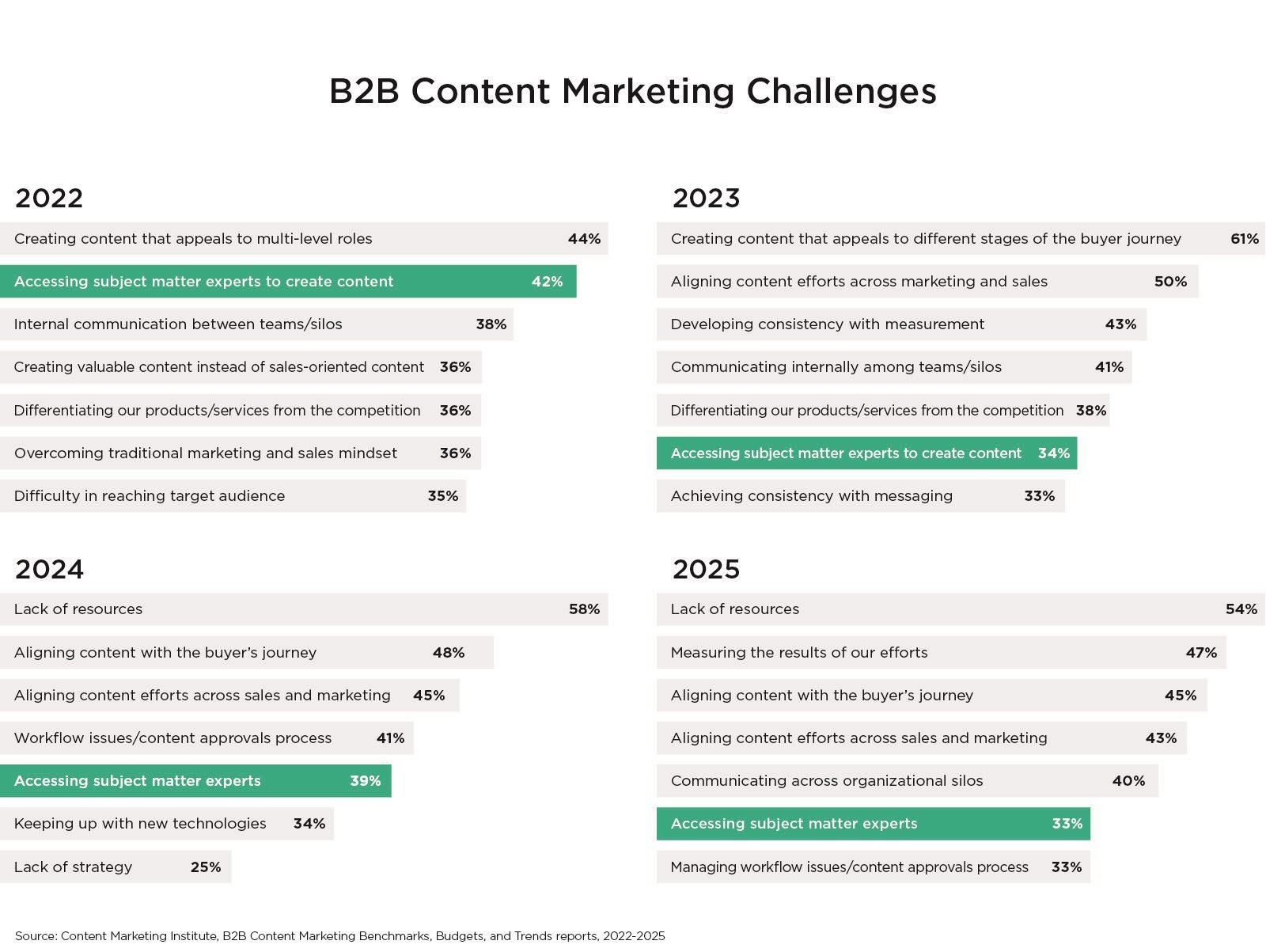The Gist
-
SME collaboration benefits. Involving subject matter experts in content creation enhances value. It provides deep insights and credibility, benefiting both marketers and SMEs.
-
Clear communication matters. Clear workflows and defined expectations help streamline collaboration with SMEs, reduce confusion and align efforts with business goals.
-
Content repurposing tips. SMEs’ existing presentations and conversations can be transformed into valuable content, which saves time and makes the most of their expertise.
If you’re a B2B marketer, you know you need to be extra nice to subject matter experts (SMEs) within your company because you so often depend on them. Imagine trying to create high-value, audience-focused, non-fluffy marketing content without the grounded insights of product managers, technical sales engineers and customer success managers.
Not happening.
And they’d love to help you with your content. Except for that little thing called their day job. In short, SMEs are extremely busy and hard to reach.
That’s why B2B marketers consistently rate accessing subject matter experts to create content as one of their top content marketing challenges, according to the Content Marketing Institute’s B2B Content Marketing Benchmarks, Budgets, and Trends reports.
But this challenge isn’t intractable. Below, veteran content strategy and product marketing leaders share their best advice on how to get SMEs involved in your content strategy and make the most of their expertise.
‘Accessing SMEs’ Is a Perennial Content Marketing Challenge

Understanding the Challenges SMEs Face in Content Creation
Take a moment to walk a mile in a subject matter expert’s shoes. Content collaboration between subject matter experts and marketing teams can be difficult for many reasons:
-
SMEs are very busy. Sure, who isn’t busy? But SMEs typically have a full plate of responsibilities that don’t include marketing. Requests to help create content can feel like a low priority and “yet another thing” that they can’t commit to.
-
SMEs don’t understand the “why.” SMEs are less likely to engage if marketers haven’t articulated the purpose of their request and how it relates to shared strategic goals.
-
Marketers ask too much. When marketers suggest that SMEs write a blog post or white paper, this sort of open-ended request can seem overwhelming and too difficult to fulfill without assistance.
-
Marketers aren’t clear about what they need. Sometimes SME interviews go sideways. Marketers can’t extract useful insights on a thought leadership topic or get the SME to explain technical details in a user-friendly way if they haven’t laid the groundwork.
Related Article: How Tech and Customer Success Teams Can Help Each Other
5 Effective Strategies to Encourage SME Involvement
Know Your Audience and Market to Them
Alicia Saia, director of product marketing at Redjack: “Marketing success always begins with knowing your audience, and working with SMEs is no different. They’re just an internal audience. What do they care about? What’s in it for them? Explain clearly what you’re trying to accomplish and how it benefits each of you and the company.”
Build a Partnership
Millie Andino-Tyson, digital strategy and experience leader with past roles at NetApp, Automox and Lenovo: “Be clear with SMEs that you want to build a relationship and a collaboration. To that end, I like to learn more about how they prefer to approach content creation. I explain to them what’s possible, and I try to give them options, so it’s not a one-sided conversation.”
Communicate Workflow and Expectations
Rich Schwerin, content strategy leader with past roles at Oracle, VMware and Autodesk: “Communicate clearly what you’re trying to do and what will be expected of the SME. Share a clear workflow that shows them where they’ll be involved, like an initial interview and then a review for factual accuracy. I also want them to understand the objective of the content, including audience focus and journey stage. If the content asset is focused on awareness, then I’m not asking them to help create a doctoral thesis.”
Make Them Look Good
Dennis Shiao, content marketing thought leader and founder of the Bay Area Content Marketing Meetup: “Intrinsic rewards are powerful. Show the SME how their involvement will benefit them, especially with being published online and promoted through your company’s social media channels. You can help elevate their personal brand among their industry peers.
“As a marketer, it’s your job to make them a hero for participating. If a post that they helped create goes viral on LinkedIn, give them kudos and celebrate their win. Or at a company meeting, give praise to everyone who has contributed to content during the quarter.”
Incentivize Them With Rewards
Alicia Saia: “Consider what mix of incentives would appeal to them. That might be a gift card or an iPad. I’ve also seen success with tying participation to an SME’s annual bonus. For example, you’d get buy-in from the leadership of a sales engineering department, so that part of an engineer’s requirement for the bonus is to help the marketing team produce one piece of content per quarter.”
Pictured below: Top row, left to right, Alicia Saia, Dennis Shiao and Millie Andino-Tyson. Bottom row, left to right, Don Knapp, Lindy Roux and Rich Schwerin.

3 Ways to Make SME Content Creation Easier
Ghostwrite for Them
Lindy Roux, executive vice president and partner, Tendo Communications: “Most subject matter experts aren’t writers, so write it for them. The key is to conduct a productive 30-minute interview. Do your research and send them questions in advance. Record the interview and get an AI transcription, then write the piece in their voice. Ask them to review your draft and then finalize it.”
Leverage Their Existing Work and Discussions
Alicia Saia: “If an SME is delivering a webinar or presenting at a conference, you can repurpose their presentation into other content types. Even a LinkedIn post, an internal email or Slack thread, [or] a Zoom meeting about a customer engagement can be turned into a piece of content. Just compile it, clean it up, add a byline, and you’re good to go. Content is everywhere, you just have to look for it!”
Give Them Something to React to
Rich Schwerin: “Some SMEs respond well to an outline or a rough V1 draft that you’ve created on your own — rather than asking them to start from scratch. You can list the points you want to hit and get as far as you can with your own knowledge; then the SME can fill in the blanks, make edits or leave comments.”
Related Article: 11 Content Marketing Trends That Will Transform CX
4 Ways to Get the Most From Subject Matter Experts
Practice Active Listening
Millie Andino-Tyson: “When I talk to subject matter experts, I want to make sure they know I’m listening. I validate and repeat back what I’m hearing. I don’t hesitate to ask follow-up questions when I need more clarity about what they’re explaining.”
Involve Them in Editorial Planning
Dennis Shiao: “Get SME input on your content calendar. They can help you identify which thought leadership topics are resonating with customers and which ones are tired or outdated. They can identify the latest customer challenges that your content should address.”
Get Hot Takes on Industry Trends
Alicia Saia: “Ask subject matter experts to comment on broader trends and timely issues. This can sometimes be challenging if an SME is very company-focused or loves to talk about your product in a technical way. But again, make it easy for them: Use AI to summarize market research or industry trends, and ask the SME to comment on them and share [a] perspective from your company POV.”
Reuse SME Source Materials
Lindy Roux: “As you review interview transcripts and background materials, you’ll often find that they trigger ideas for future stories. Save all these files; they’re a precious resource.”
Fostering Strong SME Relationships for Long-Term Success
Building successful SME relationships requires experimentation. What works for one person might not resonate with another. But the effort pays off when SMEs are not just willing to contribute but genuinely enthusiastic about it.
“I remember a sales engineer that all of us in marketing loved to work with,” said Saia. “Over time we developed a great partnership. Eventually he started coming to us independently and saying things like, ‘Every time I’m in a customer meeting I get this same question, so I decided to write a blog post about it. Can you help me make it look good?’ And I’d tell him, ‘Oh yes. Yes I can!’”
Learn how you can join our contributor community.
